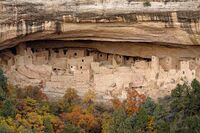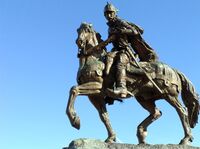Republic of Colorado
Republic of Colorado República de Colorado | |
|---|---|
| Motto: "Nil sine numine" Nothing without the divine will | |
| Capital and largest city | Denver |
| Official languages | |
| Recognised national languages | |
| Demonym(s) | Coloradan |
| Government | Unitary one-party parliamentary republic with an executive presidency |
| Friedrich von Colorado | |
| Johann von Colorado | |
| Vacant | |
| Vacant | |
| Legislature | General Assembly |
| Independence from the United States | |
| 25 March 2022 | |
| 24 April 2022 | |
• Republic | 29 October 2023 |
| 17 February 2024 | |
| Area | |
• Core Territory | 6.47 km2 (2.50 sq mi) |
• Outer Territory | 269,594.5 km2 (104,091.5 sq mi) |
| Population | |
• 2023 estimate | 22 |
| Currency | United States dollar (USD) |
| Time zone | UTC-7 (MST) |
• Summer (DST) | UTC-6 (MDT) |
| Date format |
|
| Driving side | right |
| Calling code | +1 |
Colorado (/ˌkɒləˈrædoʊ, -ˈrɑːdoʊ/), officially the Republic of Colorado (Spanish: República de Colorado), is a landlocked, self-proclaimed sovereign state commonly known as a micronation by external observers. Located in the Southwestern United States, it is entirely landlocked within the American state of Colorado. The capital and largest city of the Republic of Colorado is Denver. Colorado has two official languages, English and Spanish, as well as four nationally recognised languages. The Republic of Colorado succeeded the Grand Duchy of Colorado on 29 October 2023.
Formerly part of the Unites States, Colorado emerged as an independent state on 25 March 2022, when Friedrich von Colorado proclaimed the Grand Duchy of Colorado. Colorado remained a monarchy until October 2023 when an institutional referendum was held on 27 October 2023 to determine if Colorado should remain a monarchy or become a republic. Voters voted 80% in favour of a republic, thus giving way to the reorganisation of Colorado into a republic. On 29 October 2023, the Republic of Colorado was proclaimed by Friedrich von Colorado.
As of 31 March 2024, Colorado is an isolated state and is not currently part of any micronational organisations. Formerly, during the Grand Duchy of Colorado, relations were sustained with other countries.
Etymology
The name Colorado comes from the Spanish adjective "colorado" meaning "coloured red" or "ruddy".
History
Native America and colonisation

Native Americans were living in Colorado for over 13,000 years prior to the arrival of European settlers. Artefacts from 11,200 BC to 3,000 BC can be found at several sites around Colorado. Native Americans first dispersed over the Americas via the eastern slopes of the Rocky Mountains, which served as a significant migratory route. The Colorado Plateau's valleys and mesas were home to the ancestral Puebloans. The Ute Nation lived in the lowlands between the Southern and Western Rocky Mountains, extending all the way to the modern Front Range. The eastern and southeast regions of Colorado were also home to the Apache and Comanche people. The Arapaho and Cheyenne Nations occasionally travelled west to hunt on the High Plains.

The Spanish Empire seized Colorado and made it part of the Viceroyalty of New Spain. The eastern Rocky Mountains became a claim of the United States with the Louisiana Purchase in 1803. Following the United States' victory over Mexico in the Mexican-American War, the Treaty of Guadalupe Hidalgo was signed, resulting in the annexation of all of Colorado and northern Mexico by the United States. On 28 February 1861, an Act of Congress signed by departing President James Buchanan established Colorado as a territory. Organised militias from Colorado took part in the American Civil War, marching from Denver to Glorieta Pass in New Mexico. The militia forces strategically prevailed at the Battle of Glorieta Pass. The Texan soldiers fled Santa Fe for San Antonio after the conflict as they had lost a great deal of their supplies and received no assistance from New Mexico. The Confederacy discontinued its efforts to seize the southwest region of the United States following this.
Colorado was given the nickname "Centennial State" after it was admitted to the Union on 1 August 1876, four weeks after the country's 100th anniversary of founding. Under President Ulysses S. Grant, it was proclaimed the 38th state. On 7 November 1893, Colorado became the second state to offer women the right to vote, making history. Colorado was initially a Republican state when it was admitted, though at times provided the Democratic Party a lot of support.


The Colorado Klan Realm rose to prominence in Colorado politics throughout the 1920s. Nevertheless, a number of non-KKK solicitors and legislators saw the organisation's influence quickly dwindle, and by the end of the 1920s, it had lost its hold on power. When the Democratic Party gathered in Denver in 1908, Colorado became the first state in the American West to host a significant political convention. Colorado's population was reported to be more over one million in 1930. Colorado suffered greatly during the Dust Bowl and the Great Depression, but the consequences of both calamities were mitigated by a significant immigrant flow that followed World War II. The Chicano Movement is also credited as having originated in Colorado. In 1967, Republican Governor John Arthur Love signed a bill easing limits on abortion, making it the first state to do so. Additionally, Colorado has been the scene of a number of notable shootings, such as the tragedy at Columbine High School, the 2012 Aurora, Colorado shooting, and the 2021 Boulder shooting. With the election of the last Republican governor in 2002 and the Republicans controlling both Senate seats for the last time in 2004, Colorado began to shift its political allegiance towards the Democratic Party.
Grand Duchy
On 25 March 2022, after a week of development and preparation, Friedrich von Colorado proclaimed the independence of the Grand Duchy of Colorado. The provisional Legislative Assembly ratified a monarchist Constitution on 24 April 2022. Though the monarchist Constitution legally established the Grand Duchy of Colorado as a constitutional monarchy, the extensive prerogatives granted to the Grand Duke therein effectively established Colorado as a semi-constitutional monarchy.
Republic
Colorado became a republic after the 2023 Coloradan institutional referendum held on 27 October 2023. Following the proclamation of the Republic, Friedrich von Colorado, formerly the Grand Duke of Colorado, assumed the position of provisional government chairman.
Politics
The Republic of Colorado is a one-party state governed by the national conservative Colorado Party (PC). The Coloradan constitution states that the Republic of Colorado is a "democratic and social state established for the common good of the people of Colorado," that the political power "is derived from the people and belongs to the people as a united community of free and equal citizens," and that "the Colorado Party is the representative of the people of Colorado."
Colorado Party
According to the Coloradan constitution, the "politics of the state are under the guidance of the National Congress of the Colorado Party." The Colorado Party is also permitted to establish for itself a party constitution separate from the national constitution that outlines the "party structure and organisation, party platform and agenda, and the ideology of the party, among other things relevant to the party." The National Congress elects the Central Committee, who then elects the general secretary (party leader), the top leadership of the country. The general secretary holds ultimate power and authority over state and government and serves as the informal paramount leader. The current general secretary is Friedrich von Colorado, who took office on 29 October 2023.
Government
The Colorado government is solely controlled by the PC. The PC controls appointment in government bodies, and most senior government officials are PC members.
The General Assembly is constitutionally the "political and state representative body of the people," although it primarily serves as a "rubber stamp" body. The General Assembly meets once a month, whereas the General Assembly Standing Committee, which is made up of three members elected by General Assembly delegates, meets weekly. Elections are indirect and non-pluralistic, with the PC controlling nominations at every level. Though the Coloradan constitution establishes the PC as the Republic of Colorado's political guide and centre of authority, political parties and "non-party political organisations" that are not counter-revolutionary are authorised to be formed.
The president is elected by the General Assembly and serves as both the head of state and government. The current president is Friedrich von Colorado, who also serves as the PC's general secretary and chairman of the National Military Commission, making him Colorado's paramount leader. The president presides over the State Council, Colorado's cabinet, which is made up of the heads of ministries and commissions.
Foreign relations
As of 31 March 2024, the Republic of Colorado is an isolated state, not establishing any relations with other micronations or micronational organisations.
Macronational
| Recognised | Condemned | Unrecognised |
|---|---|---|
Military
The National Military Commission (NMC) is the governing body of the ceremonial armed forces of Colorado. Established by the Colorado Party, the NMC is jointly owned by both the party and the government of the Republic of Colorado. As such, the General Secretary of the Colorado Party is the chairman of the National Military Commission
Demographics
The demographics of the Republic of Colorado are catalogued by the National Census and Research Bureau. The first national census for the Republic of Colorado is set to take place in mid to late-2024.
Languages
English and Spanish are the two official languages of the Republic of Colorado, though the state maintains German, Japanese, Latin, and Russian as nationally recognised languages. English remains the dominant language in the Republic of Colorado nonetheless, and all government business is conducted in the language.
Religion
In its constitution, the Republic of Colorado affirms itself as a religiously plural state rather than a secular state.
See also
External links
- Official R.O.C. Government web portal - gateway to government services and sites


